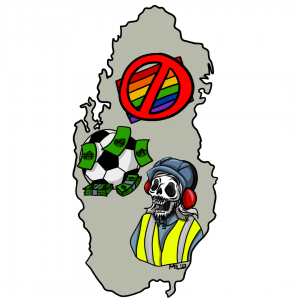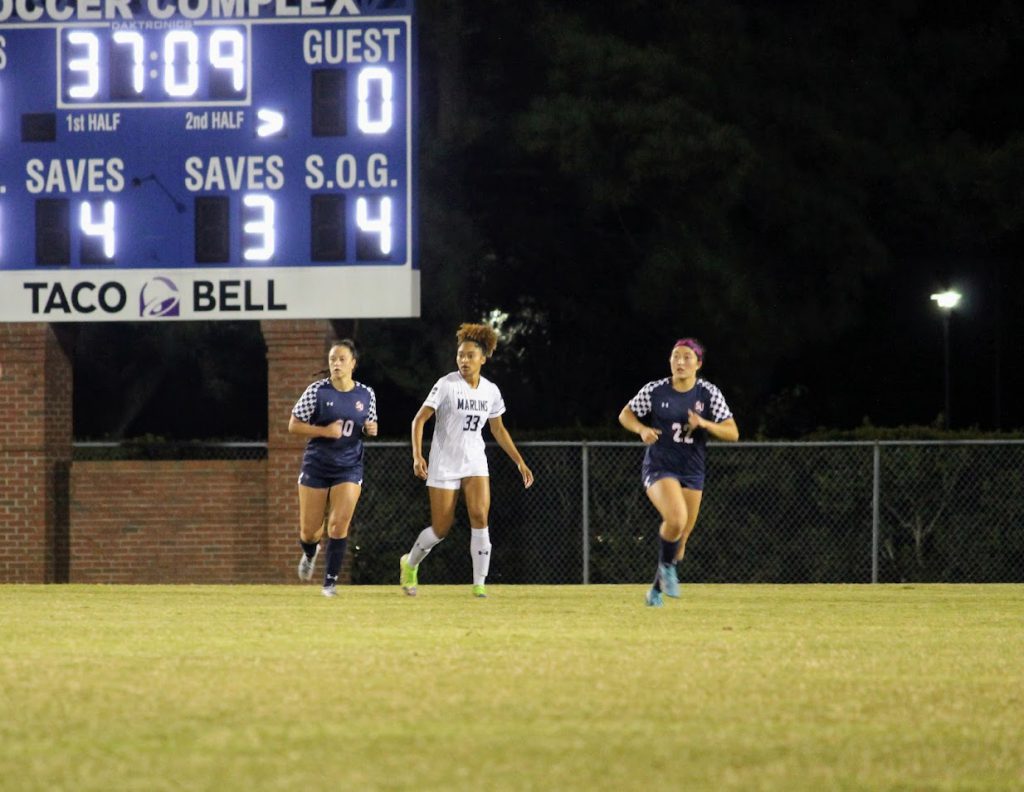The FIFA World Cup hosted by Qatar has caused an uproar because of bribery, forced labor and anti-LGBTQ policies.
OPINION
When the World Cup started on Nov. 20, it was not all received with the excitement one would expect for a tournament that happens every four years. The 2022 FIFA World Cup held in Qatar has had its fair share of controversy, negativity and pushback from fans, players and countries around the world.
Between the bribery for votes for Qatar as host, the death of migrant workers who built the arenas and the way people of the LGBTQ+ community are viewed in Qatar, there are lots of reasons why the World Cup is such a mess this year.
Qatar is not a powerhouse in football. In fact, they are the first host country in the history of the World Cup to lose their opening game and the second host country to not make it out of the group stage of the tournament. So the fact that they were selected in 2010 to host the 2022 World Cup over more reputable countries like the United States, Japan, Australia and South Korea is interesting.
Since Qatar was picked as the host back in 2010, there have been countless allegations of bribery and corruption. Most noticeably, in 2019, former French football player and former European football coach Michel Platini allegedly paid $2 million to bring the World Cup to Qatar. According to Vice, 15 of the 22 FIFA executive committee members who voted for Qatar have faced criminal charges.
This scandal first started back in 2015 when seven high ranking FIFA officials were arrested in Switzerland and charged with a variety of crimes, including fraud. This came as a result of an FBI investigation that looked into bribery that involved paying for votes, which included votes for the 2018 and 2022 World Cup in Russia and Qatar respectively.
In 2015, 14 current and former FIFA officials were accused on charges of corruption, BBC reported. Also, according to the BBC, in December of 2015, two former FIFA vice-presidents were arrested in Switzerland which then prompted 16 more officials to be charged.
Another topic being discussed during the World Cup is the deaths of migrant workers that were brought in to help build the stadiums. In Feb. 2021, the Guardian, a British-based newspaper, revealed that 6,500 migrant workers had died since 2010 when Qatar received the bid to host the 2022 World Cup.
The deaths of the 6,500 migrant workers is a misleading statistic because it is the number of migrant workers who have died in Qatar since 2010, and not the number of people who have died with causes directly related to World Cup construction. That number, Qatari official Hassan al-Thawadi revealed the deaths of migrant workers related to World Cup construction to be between 400 and 500 migrant workers.
We may never know the true number, but we do know that the living and working conditions of the migrant workers who were associated with World Cup construction were brutal. Migrant workers had to deal with unsanitary and overly cramped living conditions while working 14-18 hour days in the brutal heat of Qatar, with little or late pay given to them. Additionally, their passports were taken so they were trapped in Qatar. Some have compared the situation to modern-day slavery.
Another topic of concern for this year’s World Cup is Qatar’s view of LGBTQ+ people. Qatar is a country where an individual can be killed for being part of the LGBTQ+ community. During the World Cup, fans are not allowed to wear rainbow shirts; FIFA banned the “One-Love” armband for players and national teams for this World Cup.
Although it considers itself a democracy, Qatar states in the first article of its constitution that “[i]ts religion is Islam and Shari’a law shall be a main source of its legislations.” This Shari’a law bases its statutes off Islamic texts such as the Qu’ran; the relevant provision here is the tenet banning homosexual acts between men or women. This appears to contradict later Qatari constitutional articles promoting freedom and equality; however, it is clear that this first article supersedes all these notions. In contrast, the First Amendment of the United States Constitution explicitly states that “Congress shall make no law respecting an establishment of religion, or prohibiting the free exercise thereof; or abridging the freedom of speech, or of the press; or the right of the people peaceably to assemble, and to petition the Government for a redress of grievances.” These Constitutional articles show the priorities of these respective countries’ governments. Qatar values state conformity and religious adherence; the United States values individual freedom and religious choice.
The challenge exposed by the Qatari World Cup is how Americans should view our freedoms on an international stage. Despite FIFA banning “One-Love” armbands, players and teams have found both subtle and vocal ways to continue protesting Qatari treatment of the LGBTQ+ community.
For example, the German national team covered their mouths before their group stage game against Japan on Nov. 23. The reason they say this is because FIFA is denying them a voice since they are denying them the right to wear the armband. There was also a protester seen running across the field with a rainbow flag while wearing a shirt that said “Save Ukraine’’ on the front and “Save Iranian Women’’ on the back. This happened during a group stage game between Portugal and Uruguay on Nov. 28.
In my opinion Qatar should not have hosted the World Cup for these reasons, especially when there were other countries that gave bids to FIFA that have a richer history of soccer and more freedoms and rights in its Constitution for its citizens than Qatar.
By Colette Kearney
cmkearney@vwu.edu

